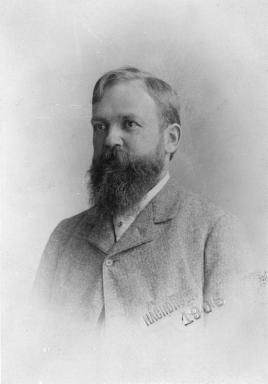Related Research Articles

The Italic languages form a branch of the Indo-European language family, whose earliest known members were spoken on the Italian Peninsula in the first millennium BC. The most important of the ancient languages was Latin, the official language of ancient Rome, which conquered the other Italic peoples before the common era. The other Italic languages became extinct in the first centuries AD as their speakers were assimilated into the Roman Empire and shifted to some form of Latin. Between the third and eighth centuries AD, Vulgar Latin diversified into the Romance languages, which are the only Italic languages natively spoken today, while Literary Latin also survived.

August Friedrich Pott was a German pioneer in linguistics.
Milan Budimir was a distinguished Serbian classical scholar, professor, Serbian philosopher and Chair of the Department of Classical Philology.

Winfred Philip Lehmann was an American linguist who specialized in historical, Germanic, and Indo-European linguistics. He was for many years a professor and head of departments for linguistics at the University of Texas at Austin, and served as president of both the Linguistic Society of America and the Modern Language Association. Lehmann was also a pioneer in machine translation. He lectured a large number of future scholars at Austin, and was the author of several influential works on linguistics.
Ernst Wilhelm Oskar Windisch was a German classical philologist and comparative linguist who specialised in Sanskrit, Celtic and Indo-European studies.

Eric Pratt Hamp was an American linguist widely respected as a leading authority on Indo-European linguistics, with particular interests in Celtic languages and Albanian. Unlike many Indo-Europeanists, who work entirely on the basis of written materials, he conducted extensive fieldwork on lesser-known Indo-European languages and dialects, such as Albanian, Arbëresh and Arvanitika; Breton; Welsh; Irish; Resian and Scots Gaelic.
Hermann Osthoff was a German linguist. He was involved in Indo-European studies and the Neogrammarian school. He is known for formulating Osthoff's law, and published widely on Indo-European word-formation and morphology.
Hugo Ernst Mario Schuchardt was a German linguist, best known for his work in the Romance languages, the Basque language, and today especially as a pioneer in the study of mixed languages, including pidgins, creoles, and the Lingua franca of the Mediterranean.
The Vasconic substrate hypothesis is a proposal that several Western European languages contain remnants of an old language family of Vasconic languages, of which Basque is the only surviving member. The proposal was made by the German linguist Theo Vennemann, but has been rejected by other linguists.

Wilhelm Meyer-Lübke was a Swiss philologist of the Neogrammarian school of linguistics.
Eduard Rudolf Thurneysen was a Swiss linguist and Celticist.
Peter Schrijver is a Dutch linguist. He is a professor of Celtic languages at Utrecht University and a researcher of ancient Indo-European linguistics. He worked previously at Leiden University and the Ludwig Maximilian University of Munich.

Wolfgang Krause was a German philologist and linguist. A professor at the University of Göttingen for many years, Krause specialized in comparative linguistics, and was an authority on Celtic studies, Tocharian languages, Germanic studies, Old Norse and particularly runology.
Velta Ruke-Dravina was a Latvian-born Swedish linguist and folklorist, as well as a professor in Baltic languages at Stockholm University. Ruke-Dravina's research interests included children's language, language contact, and dialectology. Her doctoral thesis was about diminutives in Latvian. She held the only professorship in Baltic languages outside the Baltics and had a leading role in developing the teaching program on the subject at Stockholm University. In 1980, she was elected as a member of the Royal Swedish Academy of Letters, History and Antiquities.

Hermann Güntert was a German linguist who specialized in Germanic and Indo-European linguistics.
The Ambisontes were a Gallic tribe dwelling in the upper Salzach valley during the Roman period.
The Rucinates or Rucantii were a Gallic tribe dwelling in near the confluence of the Isar and Danube rivers during the Roman period.
The Catenates or Cattenates were a Gallic tribe dwelling between the Isar and Inn rivers during the Iron Age.
The Brixentes or Brixenetes were a Celtic or Rhaetian tribe living in the Alps during the Iron Age and the Roman era.
Blanca María Prósper Pérez is a Spanish linguist and scholar of Celtic studies. Since 2019, she has been Professor (Catedrática) in Indo-European linguistics at the University of Salamanca.
References
- 1 2 3 "CV" (PDF). www.oeaw.ac.at. Retrieved 2021-04-06.
- ↑ https://www.ehu.eus/documents/2300410/2456623/debernardostempel-webEstudiosClasicos.pdf/f7c63fd1-257d-4050-8659-ababed410b66?t=1404822885000 [ bare URL PDF ]